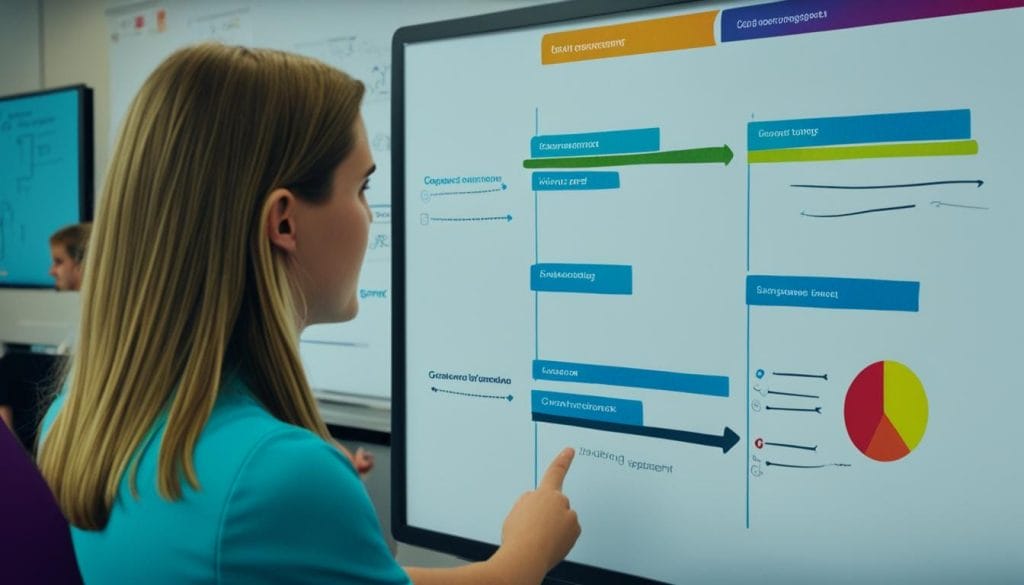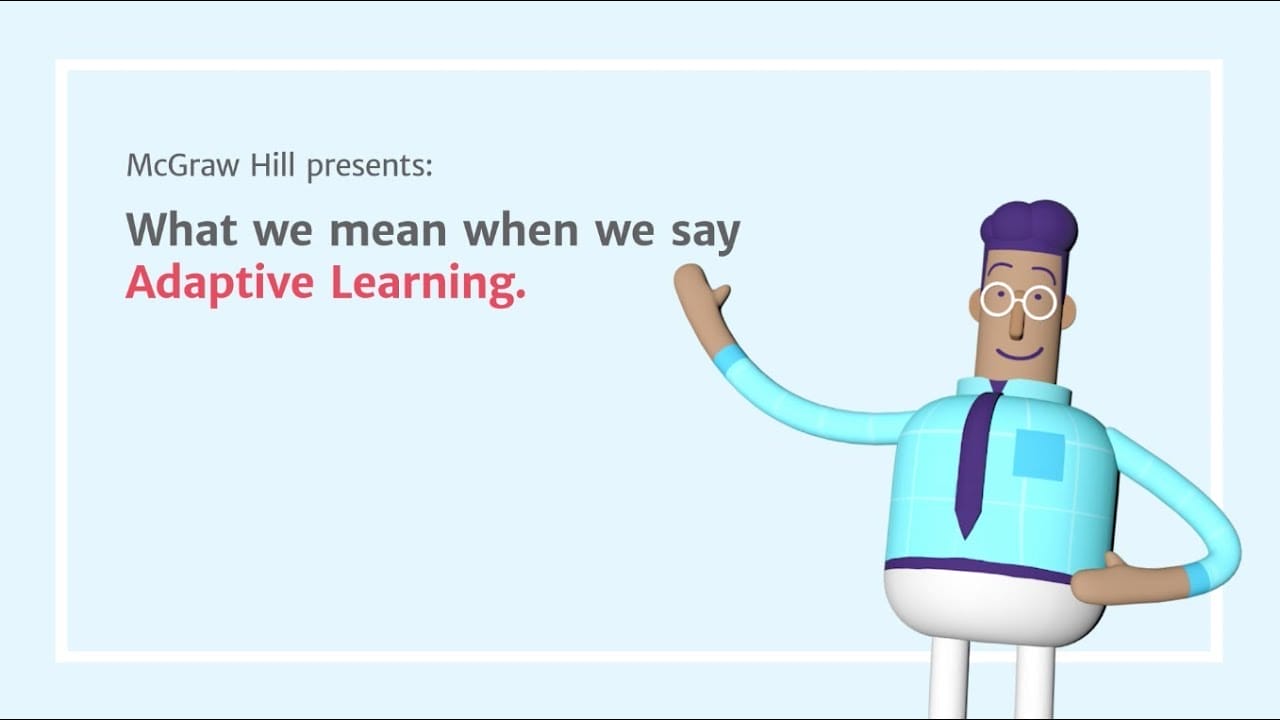Are traditional one-size-fits-all teaching methods failing to meet the individual needs of students? Is there a more effective way to personalize the learning experience? Enter adaptive learning technologies. These innovative tools harness the power of data-driven instruction and advanced technologies like machine learning and artificial intelligence to tailor learning experiences to each student’s unique needs. But how exactly do adaptive learning platforms work, and what benefits do they offer? Let’s explore the world of adaptive learning and discover how it is transforming education.
Key Takeaways:
- Adaptive learning technologies use data-driven instruction and advanced technologies to personalize the learning experience for each student.
- Adaptive learning platforms offer features like adaptive content, sequence, and assessment, which adapt based on the student’s responses.
- Benefits of adaptive learning include personalized learning experiences, increased student engagement, cost-effectiveness, and improved learning outcomes.
- Effective implementation of adaptive learning requires careful planning, support, and maintaining a teaching presence.
- Adaptive learning technologies are also making an impact in corporate training, providing personalized learning experiences for employees.
What is Adaptive Learning?
Adaptive learning is a method that leverages data-driven instruction to customize and adapt learning experiences to meet the unique needs of each student. Through the use of technology, adaptive learning platforms can track and analyze student progress, engagement, and performance, creating personalized learning experiences. This approach recognizes that learners have different abilities, learning styles, and needs, and aims to provide equitable education by tailoring the learning process for each individual.
By using adaptive content, sequence, and assessment, adaptive learning platforms offer personalized learning experiences that cater to a student’s specific requirements. This targeted approach allows learners to engage with material that is most relevant to their learning goals, helping them stay motivated and gain a deeper understanding of the subject matter.
Adaptive learning embraces the idea that education should be adaptable and responsive to the diverse needs of learners, providing them with the support and resources they need to succeed. With the help of data-driven instruction and personalized learning experiences, adaptive learning empowers students to take ownership of their education and maximize their learning potential.
“Adaptive learning tailors education to the unique needs of each student, ensuring personalized learning experiences that foster success and engagement.”
Adaptive Learning & Assessment

Adaptive learning is an integral part of the interactive learning process, which encompasses adaptive teaching and assessment. Through the integration of adaptive content, sequence, and assessment, adaptive learning software breaks down course material into manageable sections, providing immediate assistance and feedback to students while catering to their individual needs.
Adaptive content plays a crucial role by providing tailored feedback to students’ specific responses, without altering the overall sequence of skills. This ensures that students receive personalized guidance based on their understanding of the subject matter.
Furthermore, adaptive sequence continuously gathers and analyzes student data to automatically adjust what they see next. This adaptive approach ensures that students encounter learning material that is most relevant and suitable for their skill levels.
Adaptive assessment, on the other hand, adapts the questions that students encounter based on their responses. By dynamically adjusting the difficulty and complexity of assessment items, students are constantly challenged and motivated to progress.
Incorporating all three areas─adaptive content, sequence, and assessment─adaptive learning software offers a comprehensive solution that caters to the individual needs of each student. Its ability to break down complex concepts, provide immediate assistance, and adjust the learning experience promotes effective and personalized learning outcomes.
Key Features of Adaptive Learning & Assessment
- Personalized feedback and guidance based on individual responses
- Dynamically adjusted learning material to match students’ skill levels
- Adaptive assessment to challenge and motivate students
Benefits of Adaptive Learning & Assessment
Adaptive learning and assessment provides students with personalized support, enabling them to learn at their own pace and overcome individual challenges. By adapting to the needs of each student, this approach fosters a deeper understanding of the subject matter and promotes engagement and motivation.
The adaptive nature of learning and assessment ensures that students receive targeted instruction, which not only enhances their learning experience but also improves learning outcomes. With immediate feedback and the ability to adjust content, sequence, and assessment, teachers can tailor their instruction to address students’ specific needs, enabling a more effective and inclusive learning environment.
Process for Creating Adaptive Learning Scenarios
When it comes to creating adaptive learning scenarios, it’s crucial to develop content, sequence, and assessment with adaptive technology in mind. This process ensures that the learning experience is tailored to the individual needs of each student. Here’s a step-by-step guide:
1. Identify Small Knowledge Units
The first step is to break down the learning material into small knowledge units. These units are short lessons that align with the overall learning objectives. By dividing the content into manageable sections, students can focus on mastering one concept at a time.
2. Develop Assessments and Feedback
Once the knowledge units are identified, assessments and feedback should be developed. These assessments are designed to evaluate students’ understanding and provide personalized feedback. Adaptive assessment adapts the questions based on the students’ responses, ensuring that they receive targeted practice and support.
3. Design the Adaptive Learning Path
The adaptive learning path is designed based on students’ pre-assessment performance. The adaptive learning software analyzes the data and assigns students to a pathway that matches their needs. This pathway may include different learning activities, resources, and assessments tailored to their skill level and learning objectives.
4. Make Data-Driven Decisions
Instructors play a crucial role in the adaptive learning process. By analyzing the data collected by the adaptive learning platform, instructors can make data-driven decisions to adapt instruction and meet the individual needs of each student. This allows for targeted interventions and personalized support.
By following this process, educators can create adaptive learning scenarios that effectively meet students’ learning objectives and provide personalized learning experiences. The use of adaptive teaching, assessment, and technology enables a more customized and engaging learning environment for every student.
| Benefits of the Process | Explanation |
|---|---|
| Personalized Learning | The process allows for personalized learning experiences by tailoring the content and assessments to individual students. |
| Targeted Support | By analyzing student data, instructors can provide targeted support and interventions to address specific learning needs. |
| Improved Engagement | Adaptive learning scenarios increase student engagement by providing relevant and challenging content that aligns with their abilities and interests. |
| Enhanced Learning Outcomes | With adaptive learning, students can achieve better learning outcomes as the process caters to their individual learning styles and abilities. |
Benefits of Adaptive Learning

Adaptive learning offers several potential benefits, making it an effective approach in education. By leveraging personalized learning techniques, adaptive learning allows students to have more agency over their learning experience and work at their own pace. This individualized approach leads to increased success and self-direction, as students feel empowered and engaged in their education.
One of the key advantages of adaptive learning is its ability to improve student engagement. By providing personalized lessons and activities tailored to each student’s needs, adaptive learning keeps students motivated and interested in the content. This level of customization ensures that students stay actively engaged throughout their learning journey, resulting in a deeper understanding and retention of the material.
Moreover, adaptive learning can be a cost-effective alternative to traditional textbooks. By utilizing adaptive learning platforms and digital resources, educational institutions can reduce the costs associated with purchasing and updating physical textbooks. This approach not only saves money but also provides students with up-to-date and interactive learning materials that cater to their specific needs.
Another significant benefit of adaptive learning is its structured approach. Adaptive learning platforms align course objectives, lessons, practice activities, and assessments, creating a cohesive learning experience. This alignment helps students understand the relevance of each element and how they contribute to their overall learning outcomes.
Furthermore, adaptive learning provides valuable data for faculty and administrators to identify and address barriers to equity. The platform collects and analyzes student performance data, enabling educators to recognize patterns and intervene when necessary. This data-driven approach ensures that every student receives the support they need, promoting a more equitable learning environment.
Overall, adaptive learning technology enables the delivery of personalized learning at scale and maximizes learning outcomes. This innovative approach empowers students, improves engagement, and provides cost-effective solutions in education. By embracing adaptive learning, educational institutions can create a learning environment where students thrive, achieve their full potential, and prepare themselves for success in the future.
Best Practices for Making Adaptive Learning Successful
Implementing adaptive learning successfully requires careful planning and effective strategies. Here are some best practices that instructors should consider:
- Select an Adaptive Platform: Choose an adaptive learning platform that aligns with your course objectives and allows you to customize learning activities and assessments. Look for platforms that integrate well with your existing teaching methods and curriculum.
- Plan Ahead: Take the time to plan your adaptive learning approach. Define clear learning objectives and identify the specific knowledge units that need to be covered. Create a roadmap that outlines the sequence of topics and activities for your students to follow.
- Understand the Adaptive System: Familiarize yourself with the functionalities and features of the adaptive system you’re using. Understand how it collects and analyzes data, adapts content, and provides feedback to students. This knowledge will help you make data-informed decisions and effectively guide your students.
- Communicate Expectations: Clearly communicate your expectations to your students regarding their engagement with the adaptive material. Explain how the system works, how progress will be measured, and emphasize the importance of active participation.
- Utilize Learning Analytics: Harness the power of learning analytics to gain insights into your students’ progress and performance. Use this data to tailor interventions, identify areas of improvement, and provide targeted support. Learning analytics can inform your teaching decisions and help you continuously improve your instructional practices.
- Maintain Teaching Presence: Despite the adaptive nature of the learning experience, it is crucial to maintain a strong teaching presence. Engage with your students regularly, provide guidance, and offer support when needed. Act as a facilitator, ensuring that students understand the adaptive learning process and feel supported throughout their journey.
Adhering to these best practices will enhance the effectiveness of adaptive learning and create a more personalized and engaging learning experience for your students.
Adaptive Learning Technology in Corporate Training

Adaptive learning technology is not limited to traditional educational settings but is also gaining prominence in corporate training programs. This technology enables personalized learning experiences for employees, aligning with the principles of adaptive learning. Just as in education, adaptive learning in corporate training tailors the learning process to meet the specific needs of each individual.
Employing data-driven instruction, adaptive learning technology tracks the progress and performance of employees, leveraging machine learning and artificial intelligence to provide personalized content, sequence, and assessments. By incorporating adaptive learning in corporate training, organizations can offer customized training that caters to employees’ skill levels, learning styles, and job requirements.
Benefits of Adaptive Learning Technology in Corporate Training
1. Personalized Learning: Adaptive learning technology ensures that employees receive personalized training that meets their specific needs and learning styles, resulting in more effective skill development.
2. Increased Engagement: By providing adaptive content and assessments, this technology actively engages employees, improving their participation and motivation during the training process.
3. Customized Progression: Adaptive learning platforms allow employees to progress at their own pace, ensuring an optimal learning experience by tailoring the content and sequence to their individual capabilities.
4. Efficient Skill Acquisition: With adaptive learning, employees can focus on areas where they need improvement, optimizing their time and ensuring a more efficient acquisition of job-related skills.
5. Data-Driven Insights: Adaptive learning technology generates valuable data on employee performance and skill gaps, enabling organizations to make informed decisions regarding training effectiveness and resource allocation.
Example Table: Comparing Traditional Training vs. Adaptive Learning in Corporate Training
| Traditional Training | Adaptive Learning in Corporate Training | |
|---|---|---|
| Personalization | Generic training content | Personalized content tailored to individual needs |
| Engagement | Passive learning experience | Active learning experience with adaptive content and assessments |
| Progression | Fixed pace and content sequence | Customized progression based on individual capabilities |
| Time Efficiency | One-size-fits-all approach | Optimized training time by focusing on individual skill gaps |
| Data Insights | Limited data on training effectiveness | Detailed data on employee performance and training outcomes |
Adaptive learning technology in corporate training revolutionizes conventional training methods by providing personalized, engaging, and efficient training experiences. By leveraging technology and data-driven approaches, organizations can create a workforce with enhanced skills and knowledge, leading to improved productivity and performance.
The Role of Adaptive Learning in Transforming Education
Adaptive learning technologies have the potential to reshape education by providing personalized, data-driven instruction for every learner. By utilizing adaptive content, sequence, and assessment, adaptive learning platforms can offer individualized learning experiences and tailored support to help students succeed.
With adaptive learning, students have the opportunity to engage in personalized learning experiences that address their unique needs and abilities. The technology adapts to their progress, providing them with content and assessments that are suitable for their current level of understanding.
Through adaptive learning, educators can create a more equitable education system by addressing the diverse needs of their students. The technology ensures that no student is left behind or held back, as it adjusts the learning experience according to their individual requirements.
One of the key advantages of adaptive learning is its ability to enhance student engagement. By delivering content and assessments that are tailored to each student’s needs and interests, adaptive learning keeps students motivated and actively involved in their learning process.
Furthermore, adaptive learning technology improves learning outcomes by providing personalized support and feedback. It identifies areas where students may be struggling and offers targeted interventions to help them overcome challenges. This individualized approach allows students to progress at their own pace and achieve better results.
Adaptive learning also creates opportunities for continuous improvement in education. It generates valuable data on student performance, enabling educators to analyze trends, identify gaps in knowledge, and make data-driven decisions to enhance their teaching methods.
By empowering both students and teachers, adaptive learning technology plays a vital role in transforming education. It enables personalized learning experiences, enhances engagement, and improves learning outcomes. As technology continues to advance, adaptive learning will play an increasingly significant role in creating a more effective and student-centered education system.
The Future of Adaptive Learning
Adaptive learning is poised to revolutionize the future of education, driven by advancements in technology and a growing recognition of the importance of personalized learning experiences. As we continue to harness the potential of adaptive learning, it will become more refined and widely adopted, transforming the landscape of education.
In the future, adaptive learning will pave the way for a personalized, data-driven education system that caters to the unique needs of every learner. By leveraging adaptive technology, students will have the opportunity to take ownership of their learning journey, engaging in a tailored educational experience that fosters their individual growth and development.
Educators will also benefit from adaptive learning as they gain access to powerful tools and insights that enable them to effectively support their students. With data-driven instruction and personalized feedback, teachers will be equipped to address the specific needs of each student, fostering a more inclusive and effective learning environment.
The potential of adaptive learning to transform education and improve learning outcomes is immense. By leveraging technology in education, adaptive learning empowers students to reach their full potential, enabling them to acquire knowledge and skills in a way that suits their unique learning styles and preferences. The personalized future of education powered by adaptive learning holds the promise of a more equitable and impactful education system.
As we look ahead, it is clear that adaptive learning will continue to shape the future of education, revolutionizing the way we teach and learn. It opens up new possibilities for personalized instruction, student engagement, and improved learning outcomes. By embracing the potential of adaptive learning, we can create a future where every student receives the individualized support they need to thrive in an ever-changing world.
The Potential of Adaptive Learning in Education
Adaptive learning has the potential to:
- Provide personalized learning experiences tailored to each student’s needs and abilities.
- Improve student engagement by offering interactive and dynamic content.
- Enhance learning outcomes through data-driven instruction and personalized feedback.
- Foster a sense of ownership and self-directed learning among students.
- Enable educators to make informed decisions and provide targeted support.
Challenges and Considerations
While the future of adaptive learning holds great promise, there are several challenges and considerations to address:
- The need for robust and reliable data to inform adaptive algorithms and personalize instruction effectively.
- The importance of balancing technology with human interaction to ensure a holistic learning experience.
- The necessity of proper training and support for educators to effectively implement and utilize adaptive learning tools.
- The ethical implications of data privacy and security when collecting and utilizing student data.
| Benefits of Adaptive Learning | Challenges of Adaptive Learning |
|---|---|
| Enhanced student engagement | Robust and reliable data collection |
| Personalized instruction and feedback | Balancing technology with human interaction |
| Improved learning outcomes | Proper training and support for educators |
| Equitable education opportunities | Data privacy and security concerns |
Conclusion
Adaptive learning technologies are at the forefront of revolutionizing education by providing personalized, data-driven instruction for every learner. With the incorporation of machine learning and artificial intelligence, these technologies offer adaptive content, sequence, and assessment that cater to the unique needs of individual students.
By embracing adaptive learning, educators have the opportunity to create equitable and engaging learning environments that empower students to take ownership of their education. The customization and personalization offered by adaptive learning help students develop a deeper understanding of the subject matter and enhance their overall learning experience.
The future of adaptive learning holds tremendous promise for the field of education. It envisions a transformative education system that maximizes learning outcomes and prepares students for success in a rapidly evolving world. With its ability to adapt to the needs, learning styles, and abilities of each student, adaptive learning technology has the potential to revolutionize education by providing a personalized and effective learning journey for every learner.





